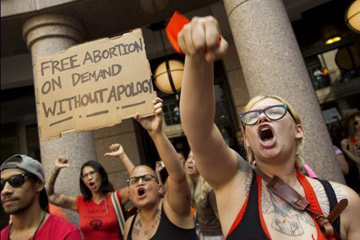Posted on March
30, 2015
Sister Apple? Oh, Brother!
Abortion harms the living, too
by
Daniel
Clark
In an attempt to reverse a decades-long decline for
their cause, pro-abortion activists have decided to become more strident. Gone is their defensive “safe, legal and
rare” rhetoric, replaced by the more confrontational slogan, “Abortion on
demand, without apology!” Rather than concede
that abortion is undesirable, they hope to destigmatize it by speaking about it
more openly. It is from this perspective
that the obligatorily three-named activist Mary Walling Blackburn has written
an online children’s book called Sister
Apple, Sister Pig.
 The
main character is a three-year-old named Lee, who is left conspicuously
gender-neutral by the author’s strenuous avoidance of pronouns (e.g., “Lee’s
uncle asks Lee if Lee would like to read a book.”). Lee’s parents have told the toddler about a
sister who had been aborted a couple years earlier. They couldn’t admit to killing her, of
course, so they’ve encouraged Lee to perceive her as a “happy ghost” who can
assume any form. This grotesque
indiscretion is the kind of thing that self-congratulatory liberals like to
call “honesty,” even though it requires them to lie.
The
main character is a three-year-old named Lee, who is left conspicuously
gender-neutral by the author’s strenuous avoidance of pronouns (e.g., “Lee’s
uncle asks Lee if Lee would like to read a book.”). Lee’s parents have told the toddler about a
sister who had been aborted a couple years earlier. They couldn’t admit to killing her, of
course, so they’ve encouraged Lee to perceive her as a “happy ghost” who can
assume any form. This grotesque
indiscretion is the kind of thing that self-congratulatory liberals like to
call “honesty,” even though it requires them to lie.
Lee points to an apple in a tree and asks if it is his
sister. Papa replies, “If you would like
the apple to be your sister … But, the winter is long and you would have to eat
her.” Lee says, “Nah! The apple is not
my sister!” The two of them walk over to
a pigpen, where Lee shouts, “The pig is my sister!” Papa says, “If you would like the pig to be
your sister, be my guest! But … will you
eat her fried, stewed, or baked?!” Lee
decides, “No, the pig is not my sister!”
When they arrive at a pond, Lee asks, “Does my sister
live here?” Ever determined to portray
reality as a matter of individual choice, Papa asks, “Do you want her to?” Lee, wanting a more conclusive answer, says,
“Well, she used to live in Mama and doesn’t anymore. She doesn’t live with us.” Papa confirms this, but without further
explanation, as if the happy ghost sister might have simply left of her own
accord.
 “I’m
not sad that my sister is a ghost!” says Lee, before launching into a
Malthusian diatribe to justify the sister’s killing on utilitarian
grounds. “If you kept my sister, you
would be tired, sad and mad! … Because we would be wild and loud and we would
fight. Mama would be scared that she
could not buy enough food for us. Mama
might not have time to read to me, to paint with me, to play with me, to talk
with me.” Papa agrees, adding, “Maybe
you will have another sister when there is more time, and there is more money.”
“I’m
not sad that my sister is a ghost!” says Lee, before launching into a
Malthusian diatribe to justify the sister’s killing on utilitarian
grounds. “If you kept my sister, you
would be tired, sad and mad! … Because we would be wild and loud and we would
fight. Mama would be scared that she
could not buy enough food for us. Mama
might not have time to read to me, to paint with me, to play with me, to talk
with me.” Papa agrees, adding, “Maybe
you will have another sister when there is more time, and there is more money.”
One wonders why, instead of “another” sister, Papa
doesn’t promise Lee that the happy ghost sister will return in the form of the
family’s next child. If Lee could make
the sister be an apple or a pig, then turning her into a new sister or brother
ought to be child’s play, so to speak. By
suggesting “another” sister, Papa tacitly admits that the first one is gone
forever.
Before long, Lee will learn to put two and two
together and figure out that the sister is dead, that it was Mama and Papa who
had her killed, and that their excuse for doing so is that they lacked the
resources to care for both her and Lee.
Sister had to die because Lee needed her food. For those scoring at home, Lee is now a
genderless believer in ghost-pigs who harbors thoughts of cannibalism, and will
soon develop an eating disorder driven by survivor’s guilt. It doesn’t really matter, because Lee’s only
importance is as a means of demonstrating the parents’ shameless embrace of
their abortion.
In the preface, Blackburn writes, “Masochists, look
elsewhere; between these pages you will not find the “luxury of grief,”
culpability’s sharp sting or salty guilt.”
What suffices for a dedication reads, “To Little Friends, earthly and
unworldly” – the unworldly ones being dead, of course. Excuse them if they don’t feel honored by the
recognition.
Those who are culpable for abortion must not be made
to feel the sharp sting or salty guilt of their culpability. No, they’re supposed to wear their
culpability smugly, like one of those “I had an abortion” tee-shirts that
Planned Parenthood tries to sell. If a
surviving sibling is made to suffer as a result, so be it. After all, what’s the sacrifice of another
child?
The Shinbone: The
Frontier of the Free Press
Mailbag . Issue
Index
. Politimals
. College
Football Czar